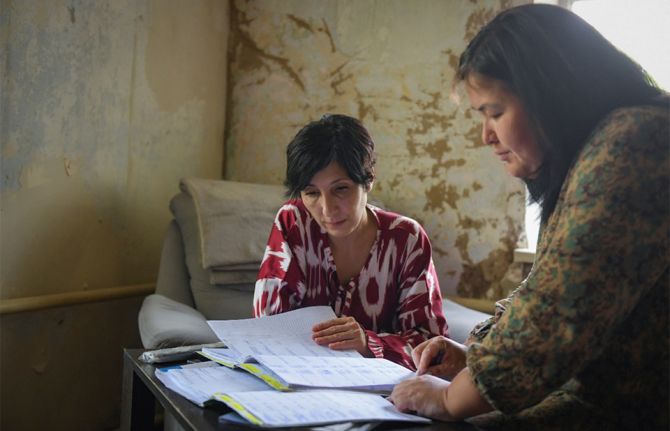
Feature Story
Building on experience to scale up HIV services
06 November 2008
06 November 2008 06 November 2008
More than 30 representatives from 10 countries of the Commonwealth of Independent States (CIS), along with UNAIDS representatives, took part in the meeting of the CIS Coordination Council on HIV/AIDS on 30 October in Moscow
More than 30 representatives from 10 countries of the Commonwealth of Independent States (CIS), along with UNAIDS representatives, took part in the meeting of the CIS Coordination Council on HIV/AIDS on 30 October in Moscow. The meeting, hosted by the Russian Government, brought together government representatives, country and regional civil society leaders and members of the Eastern European and Central Asian Union of the Organizations of People Living with HIV to build on their experiences to scale up HIV prevention, treatment, care and support.
“It is a truly unique meeting not only for the country but the region as a whole”, said Dr Luiz Loures, Director of the UNAIDS Strategic Country Intelligence Office In his remarks opening the consultation. “The urgent need to provide universal access to HIV services emphasizes the importance of improved coordination and harmonization of our efforts. That is why the CIS as a regional platform for coordination is so essential for that to happen in this region.”
The number of people living with HIV in the CIS countries rose in 2007 to an estimated 1.6 million, with an estimated 150,000 new HIV infections. This represents a 150% increase since 2001.
The HIV epidemics in the CIS area are concentrated mainly among injecting drug users (IDU), sex workers, their respective sexual partners and, to a lesser extent, men who have sex with men (MSM). Of the new HIV cases reported in 2006, for which there was information on the mode of transmission, nearly two thirds (62%) were attributed to IDUs and more than one third (37%) to unprotected heterosexual intercourse.
In light of the regional data that identifies drug use as a major driver of the epidemic in the region, all participants agreed on the urgent need to remove stigmatizing and coercive measures, and training of health providers and law enforcement personnel to be able to work effectively with IDUs in reducing the spread of HIV. So far, the percentage of injecting drug users reached by prevention programmes such as needles/syringe exchange remains small, in spite of increased funding overall.
Less than 1% of new HIV diagnoses across the region were among men who have sex with men, although the real extent to which sex between men features in some of the region’s epidemics is unknown. Deep-rooted stigma and discrimination, growing xenophobia and homophobia are major barriers to the AIDS response. This is driving the epidemic underground as people are afraid to access HIV services
The reasons behind such trends noted at the meeting comprise not only resource and capacity deficits, but also the lack of broad leadership and partnership for AIDS, including at the highest levels of governments and communities. Such partnerships would link more closely decision makers with those who have first-hand experience of AIDS realities on the ground.
Therefore, countries recognized the importance of promoting information sharing between them on issues related to the protection of human rights, promotion of effective programmatic approaches and regionally relevant best practices.
While discussing the 2009-2013 Joint CIS Programme on AIDS participants also made a strong case for mobilization of additional funds to sup¬plement the resources available through the extension of existing grants and loans provided by the Global Fund, the World Bank and other donors.
Finally, in order to guarantee the provision of universal access to HIV services in the region, participants identified the need for the development of a regional policy to en¬able proactive price negotiations for medical and laboratory commodities as well as to improve utilization of the existing regional training facilities to enhance technical capacity in the countries.
As Dr Sergei Furgal, Director, a.i., UNAIDS Regional Support Team for Eastern Europe and Central Asia, noted, “The Joint CIS Programme is based on the outcomes and recommendations of the UNAIDS-facilitated regional consultations on Universal Access as well as on the principles of hori¬zontal collaboration between the CIS countries. Regional team has been providing a substantial and solid support to the CIS as a key intergovernmental regional body in strengthening and consolidating response to AIDS.”
The next meeting of the CIS Coordination Council on HIV/AIDS is scheduled on February 2009. It will aim at reviewing regional progress and obstacles in scaling up HIV prevention, treatment, care and support towards the Universal Access targets and to develop a special regional pro¬gramme to tackle AIDS among labour migrants.
Building on experience to scale up HIV services
Feature stories:
Lars Kallings: UN Special Envoy for AIDS in Eastern Europe and Central Asia (20 Oct 2008)
HIV prevention and the uniformed services in CIS (08 Oct 2008)
Publications:
AIDS in the Commonwealth of Independent States - 2008 MAP Report (pdf, 8.8 Mb)



